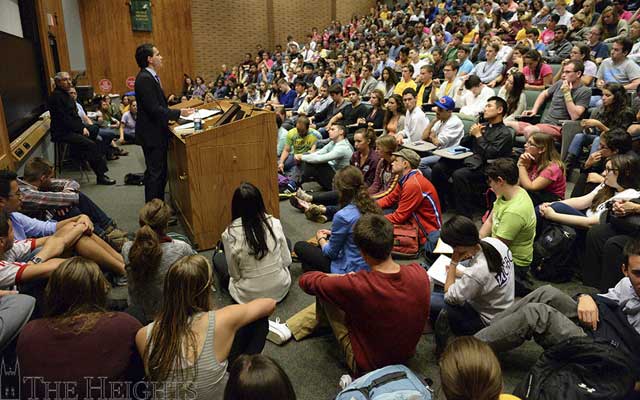Restoring Dialogue About Marriage on College Campuses
Leslie Ford /
When the Thomas More Society of Boston College invited Ryan T. Anderson, the William E. Simon Fellow at The Heritage Foundation, to make the case for marriage as the union of a man and a woman at a campus forum last week, some students questioned whether the talk should even take place. Higher education institutions are supposed to be devoted to inquiry that considers various sides of important issues—but some viewpoints seem to have become taboo and too often don’t get a fair hearing. In the end, Anderson’s clear presentation of what marriage is and why it matters led to a civil conversation showing how people on both sides of this vital issue can productively engage with one another.
Before the event, the BC Students for Sexual Health created a Facebook event advertising an “occupation” of the forum. An editorial in the Gavel, Boston College’s progressive student paper, alluded to many negative student reactions.
The night of the event, Anderson spoke to an overflowing room packed with students, many of whom disagreed with his message. It was so crowded that halfway through the discussion, the facilitators moved the gathering to a larger auditorium.
Despite the strong and divergent opinions in the room, the Boston College independent newspaper, The Heights, reported that it was a very respectful event. Students who showed up in protest of the event heard Anderson explain that redefining marriage had consequences and the rationale behind government policy on marriage in the first place: because of children, who need a mother and a father. They followed up with questions for a little over an hour, and even after the formal Q&A had ended, students stayed for another hour for discussion with Anderson.
The reactions across campus reiterated the surprise that students found as they engaged a differing viewpoint from their own. As The Heights concluded:
Anderson’s event, though controversial, provided the perfect occasion for students to reexamine their own beliefs.
The most important takeaway might be a statement from a student supporting same-sex marriage at BC’s The Rock:
I understand that as members of a younger generation, most of our peers tend to feel similarly about many social issues—gay marriage being top among them—but does that mean that we should ostracize, criticize, or ignore those with differing views?
Tolerance for people on both sides of the issues is especially critical, as officials in some jurisdictions have begun to penalize citizens who take a stand for marriage as the union of a man and a woman. As President Obama has said before, there are people of good will on both sides of this debate. It’s time for us to listen to one another.

